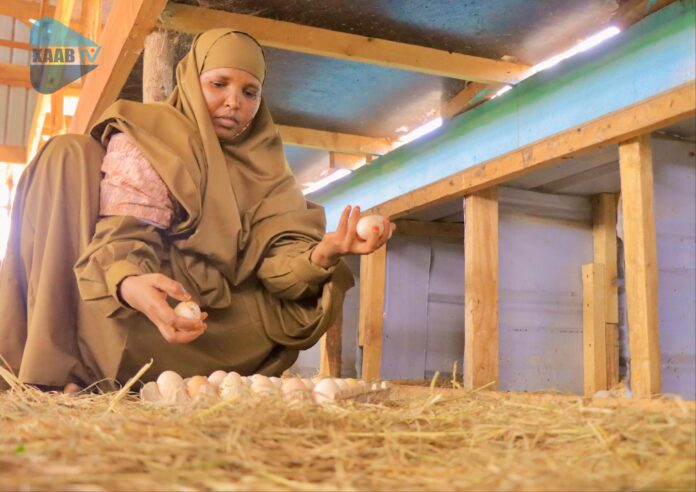KISMAAYO (Kaab TV) — Halima Ali Mohamed spent 30 years living in refugee camps in Kenya. Before Somalia’s civil war erupted, her family were farmers in southern Somalia.
Halima, her husband, and their four children lived in the camps for decades. But in 2018, encouraged by the improving security situation in southern Somalia, she decided to return to her hometown—Kismayo.
Her return came years after Kenyan forces, as part of the African Union Mission in Somalia (AMISOM), alongside Ras Kamboni forces (now Jubaland forces), liberated Kismayo from Al-Shabaab control in 2012.
This military success led to the reopening of Kismayo’s airport and seaport, encouraging thousands of refugees to return home and sparking the revival of local businesses.
Halima, a mother of four, received housing support from the Jubaland administration and local NGOs.
But Halima had a bigger dream. She began surveying the business environment in Kismayo, looking for opportunities. One gap immediately caught her attention: poultry farming.
“There were no poultry farms in all of Jubaland. Chicken meat and eggs were imported from Kenya and other countries,” Halima told Kaab TV.
Somalia is heavily reliant on imported poultry products
Somalia is heavily reliant on imported poultry products. For instance, in 2018, Somalia imported $119,000 worth of poultry from Ethiopia, $21,500 from Belgium, and $2,160 from Kenya. In 2023 alone, Somalia imported $6.2 million worth of domestic eggs from Turkey, $175,000 from India, $79,400 from the United Arab Emirates, and $3,730 from Kenya.
Seizing the opportunity, Halima joined forces with 20 other women to establish a small poultry farm, setting up their first operation in a single room, each woman contributing around 100 chickens.
However, the beginning was difficult. Many chickens started dying due to a lack of proper knowledge on poultry care.
Seeking help, Halima and her colleagues reached out to a local NGO, SWSO, which provided training on proper feeding, hygiene, and disease prevention for chickens. The training proved critical in saving their business.
Today, Halima’s poultry farm supplies many customers across Kismayo.
“Our customers include bakeries, families, and staff from local aid agencies who prefer healthy, locally raised eggs,” Halima explained.
“Yes, it is profitable,” she added with a smile.
But now, a major new challenge threatens her business: the issue of vaccine supply and cold storage.
Halima sources poultry vaccines from Nairobi, Kenya—vaccines that must be kept refrigerated and used promptly.
Recently, the Somali federal government suspended all direct flights between Nairobi and Kismayo, requiring all flights to pass through Mogadishu instead.
This new policy caused delays, leaving Halima’s vaccines stuck in Mogadishu for several days, during which the cold chain was broken. When finally used, the spoiled vaccines led to the death of more than 900 chickens.
“It’s devastating to lose 900 chickens overnight after investing so much time and money. The loss is unbearable,” Halima said in distress.
Still struggling to recover from the financial hit, Halima has one message for the Somali federal government:
“We are ordinary citizens, struggling to survive. We have nothing to do with politics. I request the government to reopen direct flights to Kismayo,” she pleaded.
“When a woman has financial means, she also has the freedom to meet all the needs of her children,” she adds


